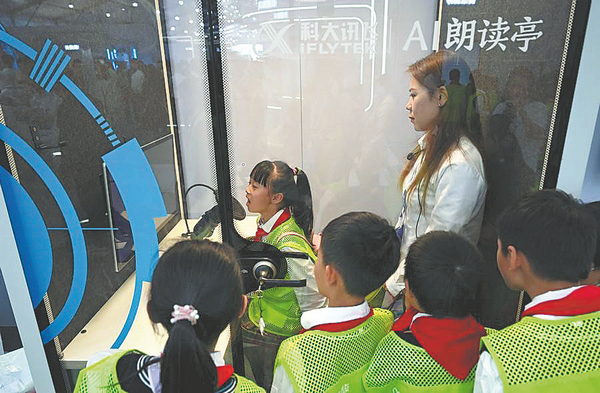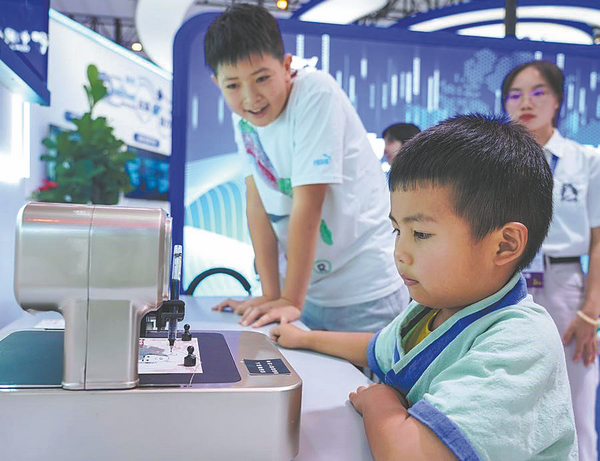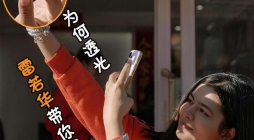AI coming to primary and secondary schools to maximize learning by machine
Source: China Daily | 2025-02-25 | Editor:Jennifer

Children try an AI-powered reading device during the 6th World Voice Expo in Hefei, Anhui province. ZHOU MU/XINHUA
"Confucius, does the phrase 'To learn and constantly review what one has learned, isn't that a delight?' mean that we should frequently review our lessons?"
In a fourth-grade classroom at Xinyilu Primary School, Qinhuangdao, Hebei province, a student posed this question to a virtual figure on the screen. The digital "Confucius", dressed in traditional attire, nodded gently and replied, "Indeed. By revisiting what one has learned, one can gain new insights."
With the integration of artificial intelligence-powered virtual teaching assistants, historical figures can now come to life in classrooms, providing students with an interactive learning experience.
The deep integration of AI and education will bring about major changes to education and the way schools are organized, says Xue Lan, dean of the Schwarzman College at Tsinghua University. "As a personalized learning hub, AI offers limitless possibilities."
The Tianjin Huiwen Middle School has gone through three stages of AI exploration in education.
In 2017, it organized a sci-tech club to engage a small group of students interested in AI, allowing them to try out for robotics and other competitions. By 2022, the school was determined to broaden the reach of its AI education programs.
It specially created sci-tech innovation courses covering robots, drones and the annual robot competition, RoboMaster, to expand the variety of AI education.
AI has now been integrated into daily teaching at the school, and serves as a teaching assistant bringing new experiences to traditional education.
The development of AI education at Huiwen is similar to other schools in China. Educators widely acknowledge AI's transformative impact on classroom efficiency.
"As part of our school's digital transformation, every classroom is now equipped with smart interactive boards and AI-powered virtual assistants, enabling real-time human-machine interaction," says Principal Yao Hairong of Xinyilu Primary School. "This not only enhances teaching efficiency but also significantly boosts students' learning engagement."
Many parents believe that AI-driven learning makes lessons more engaging and increases interest.

Children watch an AI-powered robot sketching a portrait during the 8th China-South Asia Expo in Kunming, Yunnan province, last year. WANG JINGYI/XINHUA
A mother of a fifth-grade student, surnamed Li, says that AI has sparked her daughter's interest in making PowerPoint slides and generating AI templates.
"I hope she will be inspired by this and get to know computer technologies," says Li.
Teachers and parents have also shown concern about the use of AI in the study.
"AI-generated teaching material still has its limitations," says Ni Lili, a teacher at Xinyilu Primary School. "Presentations, speeches and supplementary materials produced by AI often lack personalization and do not fully reflect a teacher's particular style.
"Additionally, AI-generated images and multimedia content sometimes do not align precisely with the given descriptions, requiring manual adjustment," she says.
Parents also expressed concerns that excessive reliance on AI may weaken problem-solving abilities.
"When my child encounters a difficult question, her first instinct is to ask AI for the answer instead of thinking through the problem herself," Li says.
Education experts emphasize that AI should serve as a tool to support student thinking rather than as a substitute for independent reasoning.
"AI in education should focus on guided learning, helping students develop problem-solving skills, rather than simply providing answers," one expert says.
In February 2024, 184 schools were chosen as pilot centers to explore the philosophies, models and programs of AI education. The goal is to develop exemplary cases and experience that can be promoted on a larger scale.
In order to support the integration of AI into basic education, the Ministry of Education issued a directive in late 2024 outlining key objectives for advancing AI in primary and secondary education.
The plan aims to establish a structured AI curriculum, promote AI-driven teaching and assessment, and achieve full AI education in primary and secondary schools by 2030, equipping students with AI literacy and practical skills.
You May Like
-
DeepSeek's rise heralds seismic change in AI landscape
Competition is heating up in the fast-developing artificial intelligence sector as the emergence of startup DeepSeek underscores China's growing innovation capa...
InKunming 2025-02-19 -
AI spread validates power of human progress
DeepSeek has launched a series of innovative, large-model AI products, creating a global sensation.
InKunming 2025-02-18 -
China seeks AI growth benefiting all
As the United States was absent from a collective pledge to drive inclusive AI development at the Artificial Intelligence Action Summit in Paris, France, the Ch...
InKunming 2025-02-13 -
Chinese brands fuel AI drive at major tech event
At CES 2025, the popular annual consumer tech show in Las Vegas, a number of Chinese companies have emerged as pioneers in leveraging artificial intelligence an...
InKunming 2025-01-08 -
Country heads charge for AI competitive edge
As the latest tech frontier, the fast development of artificial intelligence is poised to play a pivotal role in driving China's industrial upgrade, experts and...
InKunming 2024-12-30 -
AI assistant gives pathologists helping hand in cancer detec...
Artificial intelligence-enabled medical diagnostic tools are ensuring greater accuracy in cancer screening and detection, helping doctors arrive at more precise...
InKunming 2024-12-26 -
The future of smartphones transformed by AI
The future of the smartphone industry is set to be transformed by generative artificial intelligence technology, which will drive product upgrades and will repr...
InKunming 2024-11-26 -
AI offers fresh potential for group's cooperation
When Dipuo Mazibuko embarked on her first overseas travel in September, it was to China. She took a close look at the country's achievements in the field of art...
InKunming 2024-10-22 -
3rd global digital trade expo highlights AI innovations, low...
The third Global Digital Trade Expo opened in Hangzhou, capital of east China's Zhejiang Province, on Wednesday, showcasing the latest technological innovations...
InKunming 2024-09-26 -
Latest trends in Mathematics and AI discussed in 2024 WAIC i...
The 2024 World Artificial Intelligence Conference (WAIC) on "Mathematics and Artificial Intelligence" hosted by the Smale Institute for Mathematics & Computatio...
InKunming 2024-07-07







